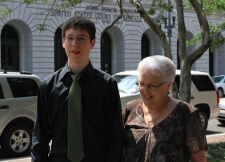
|
|
Jonathan Morgan, now 16, and Marie Barnett Snodgrass, of the landmark Barnette v. West Virginia case, standing in front of the Fifth Circuit Court of Appeals in New Orleans, Monday. |
The
Fifth District Court of Appeals heard arguments Monday for the
Morgan v. Plano Independent School District case, known nationwide as
the “candy
cane case.”
The
case, which has been ongoing for eight years, raises the question:
Does an elementary school student have a First Amendment right to
free speech? It all started when then 8-year-old Jonathan Morgan was banned from bringing candy cane pens to a winter party because the poems attached mentioned Jesus.
“The
school officials are asking the court to change the law to actually
allow religious discrimination
for the first time in American law,” says Kelly Shackelford,
president and CEO of Liberty Institute, which represents several
students and their parents in the case. “The judges were very
attentive and active today, and we are hopeful they will reject this
radical request from the school officials.
“I
think it was pretty clear right off the bat that a number of judges
were very disturbed by arguments made by the school district’s
lawyers,” Shackelford adds.
According
to Shackelford, the school district has changed its argument—even
though it has appealed in court several times before
now—claiming the free speech laws are unclear, and officials did
not know they were violating the children’s rights.
“The
big surprise today in the courtroom is that now the defendants are
trying to shift their argument
by throwing Plano Independent School District and their
representation under the bus, and that school officials have no
responsibility to know that they cannot engage in religious
discrimination against student speech,” Charles Bundren, affiliate
attorney with Liberty Institute, said yesterday.
Two
former U.S. Solicitors General argued the case on the students’
behalf: Paul Clement and Baylor
University President Kenneth Starr.
“This
is ‘cold on the docks’ unconstitutional. We come in the spirit of
Barnette v. West Virginia,
that school districts have the responsibility to obey the law,”
Starr says.
In
the case Starr mentions, West Virginia State Board of Ed. v.
Barnette, the U.S. Supreme Court ruled that it was unconstitutional
to require children to salute to the nation’s flag.
Although
Shackelford says several judges seemed to be outraged by the
arguments of the defense, he also noted that not each of the 17
reacted that way. “You don’t know how it’s going to turn out.
Nobody knows what’s going to happen with this,” he explains.
The
judges will take months to deliberate, and Shackelford asks that the
nation pray on their behalf. “This is going to be one of the
biggest liberty cases,” he says. “It’s going to affect the whole
country. I would encourage folks to put this on their prayer list.
The Lord can certainly have an influence.”











































